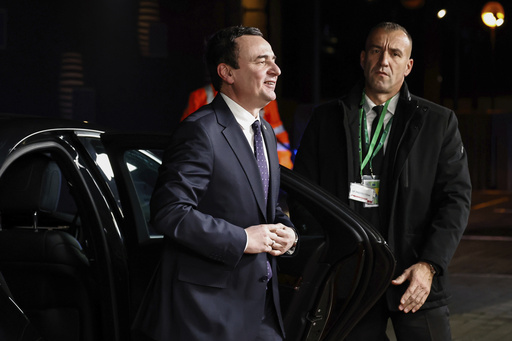PRISTINA, Kosovo — The primary ethnic Serb political organization in Kosovo has declared that its disqualification from the upcoming general election constitutes “institutional and political violence” against the Serb community in the region. Zlatan Elek, a representative from the Srpska Lista (Serb List), claimed that the decision was made under the direction of Prime Minister Albin Kurti, alleging it’s an attempt to secure easy political advantages. He also stated that they plan to challenge this ruling.
The Central Election Commission has withheld its endorsement of Srpska Lista, citing the party’s nationalist tendencies and its strong affiliations with Serbia as the rationale for their choice. This group currently holds nine of the ten parliamentary seats allocated to the ethnic Serb population within Kosovo’s 120-seat assembly.
As Kosovo prepares for its parliamentary elections set for February 9, this situation is anticipated to serve as a significant trial for Kurti’s leadership, especially since his party enjoyed a substantial victory in the 2021 elections. Post-election, any governing body will be required to prioritize negotiations facilitated by the European Union aimed at normalizing relations with Serbia.
The international community has also voiced apprehension regarding this political maneuver, expressing fears that it might exacerbate the already strained relations between Kosovo and Serbia. Historically, Kosovo remained a province of Serbia until a devastating conflict erupted between Serbian government forces and ethnic Albanian separatists, resulting in approximately 11,400 fatalities, primarily among ethnic Albanians. Following a NATO intervention that lasted 78 days in 1999, the conflict ended, leading to the expulsion of Serbian forces. Kosovo subsequently declared its independence in 2008, a move that has not been acknowledged by Serbia, which continues to regard Kosovo as part of its territory.
Serbian President Aleksandar Vu?i? criticized the disbandment of the Serb party, asserting that Kurti is attempting to eradicate the Serb population from Kosovo. Kurti, however, has denounced Srpska Lista as an extension of “Serbian state terrorism” linked to Milan Radoicic, who has been described as a significant figure in both business and politics with strong connections to Serbia’s ruling party and Vu?i?. Radoicic has faced charges related to a violent incident that resulted in the death of a Kosovar police officer, but remains free and is being investigated in Serbia, which has declined to extradite him.
Kurti has accused the Serb party of inciting disturbances in the four municipalities with significant Serb populations. During a press conference, he emphasized that Srpska Lista exemplifies Serbia’s profound and detrimental involvement in Kosovo’s internal matters and its electoral processes.
Furthermore, Kurti has asserted that Belgrade is supporting two terrorist factions engaged in orchestrating and financing plots against Kosovo. He claimed that Vu?i? is planning further provocations in Kosovo surrounding the New Year celebrations and Orthodox Christmas, possibly to distract from ongoing protests and civil unrest within Serbia.



